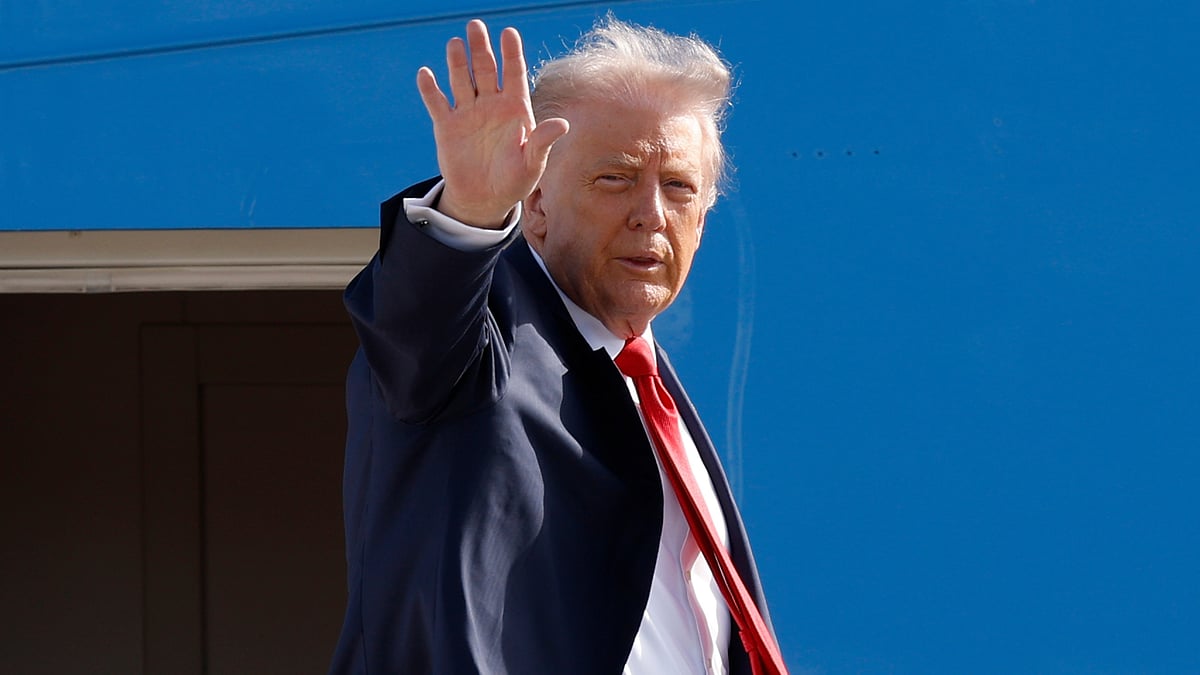World
Trump denies ordering Venezuela ground strikes amid attack reports
The plans are part of Washington’s broader campaign against President Nicolás Maduro’s regime, accused of drug trafficking

US President Donald Trump has dismissed reports suggesting that the United States has decided to launch ground strikes inside Venezuela, saying no final decision has been made regarding potential military action in the South American nation.
Speaking to reporters while boarding Air Force One on Friday, Trump said, “No, it’s not true,” when asked whether he had authorised ground strikes on Venezuelan military targets. His remarks contradicted a Miami Herald report claiming that the Trump administration had approved the strikes, which could reportedly begin within hours or days.
According to Bloomberg, Trump reiterated that no such decision had been taken, contradicting earlier media reports of imminent attacks on Venezuela’s military facilities. The Wall Street Journal had also reported on Thursday evening that the White House was weighing possible airstrikes on key targets but had not yet reached a conclusion.
The alleged military plans are part of Washington’s broader campaign against President Nicolás Maduro’s government, which the US has accused of running a drug-trafficking network, charges Caracas has repeatedly denied.
Sources cited by the Herald suggested that the potential targets could include ports, airports, and naval facilities allegedly used by the Venezuelan military for smuggling operations.
While the Herald report did not clarify whether Maduro himself would be targeted, any land-based military action would mark a sharp escalation of US operations in the region. So far, American forces have limited their actions to maritime strikes against boats suspected of carrying narcotics off Venezuela’s coast, operations that have resulted in 61 deaths and sparked bipartisan criticism in Washington.
Foreign policy experts suggest the strikes may have less to do with combating drug trafficking and more with efforts to destabilise Maduro’s regime.
Analysts told BBC News that US intervention could be part of a push for regime change, noting that the government has yet to establish a firm legal or factual basis for direct military action. Maduro, in response, has accused the United States of “fabricating a new war” to seize Venezuela’s oil and natural resources.
The US government, which does not recognise Maduro’s presidency following a disputed 2024 election, has intensified its pressure campaign in recent months. In August, the Departments of Justice and State doubled the bounty for information leading to Maduro’s arrest or conviction on drug trafficking charges to $50 million.
Despite the denials from Trump, the reports of possible escalation have reignited debate in Congress. Lawmakers from both parties have questioned the legality of the existing maritime strikes, which were authorised under an executive order classifying certain drug cartels as terrorist organisations.
Published: undefined
Senate Democrats previously sought to restrict further military action through a war powers resolution, arguing that the executive order did not provide sufficient legal authority for force against a sovereign state.
Although that resolution was narrowly defeated in a 48–51 vote, several Republicans joined Democrats in opposing unilateral military action. Senator Rand Paul criticised the strikes, calling it “despicable and thoughtless” to justify killings without trial.
Representative Mike Turner said members of Congress had expressed concern over the administration’s lack of transparency during a classified briefing on Thursday, in which officials provided “not very good answers” regarding the legal rationale for the strikes.
The Senate is expected to revisit the issue next week, with lawmakers preparing to vote on a revised war powers resolution aimed at preventing U.S. forces from engaging in “hostilities” inside Venezuela.
Democratic Senator Adam Schiff said in an 17 October statement that “the Trump administration has made it clear they may launch military action inside Venezuela’s borders and won’t stop at boat strikes in the Caribbean.”
Venezuelan President Nicolás Maduro has repeatedly condemned US actions as attempts to overthrow his government and expand Washington’s military influence in Latin America. Earlier this month, Colombian President Gustavo Petro accused the US of “murder” for killing drug suspects during naval operations in the Caribbean.
As diplomatic tensions mount, Washington’s next steps remain uncertain, but the controversy has already reignited long-standing debates over the limits of presidential war powers and America’s role in Latin America.
With IANS inputs
Published: undefined
Follow us on: Facebook, Twitter, Google News, Instagram
Join our official telegram channel (@nationalherald) and stay updated with the latest headlines
Published: undefined